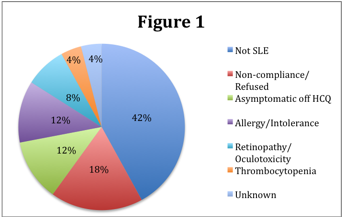Session Information
Session Type: Abstract Submissions (ACR)
Background/Purpose: Hydroxychloroquine (HCQ) is a mainstay in the current treatment of systemic lupus erythematosus (SLE). HCQ has been shown to reduce the incidence of SLE flares, reduce the risk of irreversible end-organ damage, and improve survival in SLE patients. Yet, few studies have been devoted to examining its prevalence of use. Prior papers have either examined HCQ use as a secondary endpoint (56-64%) or as a primary endpoint in a community practice (55%). Our study aims to identify the prevalence of HCQ use in an urban academic rheumatology practice and to identify the reasons for nonuse.
Methods: A search of medical records with a diagnostic code for systemic lupus erythematosus (710.0) was performed for patients seen within a three-month period (September 1 – December 1, 2011) at Beth Israel Medical Center’s rheumatology clinic. Charts for 211 patients were reviewed for active use of HCQ; if the patient was not on HCQ, the chart was further reviewed and an explanation for nonuse was documented if present.
Results: A total of 161 out of 211 SLE subjects (76.3%) were found to be actively using hydroxychloroquine. Among nonusers, 21 (42%) did not have a definitive diagnosis of SLE; 9 (18%) were either non-compliant or refused treatment; 6 (12%) had an allergy or intolerance to HCQ; 6 (12%) were not taking HCQ for unclear reasons but were asymptomatic; 4 (8%) reported a history of HCQ-induced oculotoxicity; and 2 (4%) developed thrombocytopenia presumed secondary to HCQ (Figure 1).
Conclusion: The use of HCQ in SLE patients at our institution exceeded rates of use reported elsewhere. Nonetheless, almost ¼ of potential candidates for treatment were not prescribed HCQ. Almost half of the non-prescribed patients lacked a definitive diagnosis of SLE. The majority of the other non-takers had a documented explanation. Our results help to better define reasons for nonuse of HCQ in patients with SLE. It is hoped that recognition of these factors could help to further increase the use of HCQ in SLE patients.
Disclosure:
J. G. Miceli,
None;
H. D. Fischer,
None.
« Back to 2013 ACR/ARHP Annual Meeting
ACR Meeting Abstracts - https://acrabstracts.org/abstract/hydroxychloroquine-use-among-systemic-lupus-erythematosus-patients-in-an-academic-rheumatology-practice/

